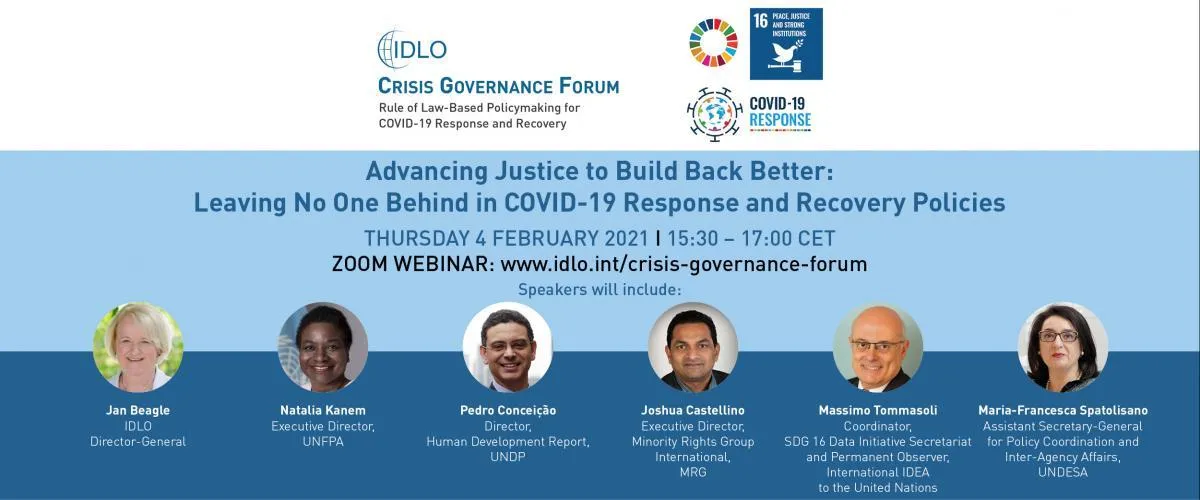Crisis Governance Forum: Rule of Law-Based Policymaking for Covid-19 Response and Recovery

The International Development Law Organization (IDLO) organized and mediated the Crisis Governance Forum on 4 February 2021 to create a platform for stakeholders to share policymaking experiences in regards to the Covid-19 crisis and its global issues, and to discuss the response and recovery efforts that can advance our society and build back better, in accordance with the 2030 Agenda for Sustainable Development.
The event was hosted by IDLO’s Director-General, Jan Beagle, and it aimed at building a more sustainable, inclusive and resilient future, protecting those who have been left behind, following the SDG16 roadmap. The center of the discussion was inequality: how it defines our times and how the crisis has more negatively affected people who were already falling behind. “The crisis has uncovered vulnerabilities and inequalities that governance now needs to address,” stated Beagle, adding that we need an effective response across all structures of our society and governance, and we need that response immediately. While the rising issues uncovered by the Covid-19 crisis are numerous, the forum focused on inequalities related to women and minorities—with 2020 being a setback for the empowerment of women and for the battle against extreme poverty.
“Covid-19 has not been the greater equalizer,” commenced Dr Natalia Kanem, Executive Director of UN Population Fund (UNFPA), and “gender has influenced the impact of the pandemic” (…) “as women bear the burden of care.” Dr Kanem stressed the role of women and the importance of protecting their human rights, which shouldn’t be negotiable or constantly politicized by governments—particularly during times of crisis. Women, she added, have suffered the consequences of the pandemic not only in terms of health crisis, but they have also suffered discriminations in their education and health services (e.g. access to care and contraception), and they have increasingly been victims of violence. Along the same lines, Pedro Conceição, Director of Human Development Report at UN Development Programme (UNDP), highlighted how there have been more job loss for women rather than men, adding that “job sectors where women are overrepresented have been more affected by the pandemic,” which creates an additional challenge for them and triggers a reversal of progress, with more and more women pulling now back from the labor force. Mr Conceição also offered an historical perspective, looking at the past to understand how societies can face challenges and deal with inequality.
Minorities and their rights were at the core of Executive Director of Minority Rights Group (MRG) Joshua Castellino’s speech, who focused on the negative effects of the pandemic on different communities and minorities around the world, describing the additional challenges some minorities have been, and are facing today in fighting the crisis. In specific, he provided examples of ineffective guidelines used to advise certain communities (e.g. constantly wash your hands—in communities with no running water) on how to stay safe and limit the spread of the virus during the pandemic.
Massimo Tommasoli, Permanent Observer for International IDEA to the United Nations, also raised issues regarding minority rights and the need to map invisibilities to reach the 2030 Agenda and being able to implement the set goals in meaningful ways for everyone. Tommasoli stressed the need to gather and analyze reliable data, which has practical implications and is “a real challenge at the time of the pandemic”, which is why there is a need for creative new methodologies to overcome physical barriers of today. Tommasoli reiterated the importance of data, also highlighting International IDEA’s tool—the Global Monitor —which makes data about the impact of Covid-19 on democracy and human rights available to everyone. Tools like this, he stressed, can help us understand the effects of the crisis, like the human rights limitations which followed certain extraordinary measures in most countries during the pandemic.
Lastly, the issues about vaccine availability was discussed by the panelists, in regards to the need of vaccine equity for everyone in every part of the world—currently not the reality, as vaccination is showing the same trend of inequality across countries as we have seen above for economy and social issues. While “fighting inequality is not just a moral imperative, it is a necessary condition for sustaining development as we recover from the pandemic,” in Jan Beagle’s words—and it is, again, the inequality, the asymmetry in power and voice between different groups of our society, that contributes to that growth of inequality gap and feelings of insecurities among the most vulnerable.
In the closing remarks by the Assistant Secretary-General for Policy Coordination and Inter-Agency Affairs at the UN Department of Economic and Social Affairs (UNDESA), Maria-Francesca Spatolisano, she underscored the relevance of a functional, better cooperation between policymaking and science, as well as transparency, accountability and active participation in our civic institutions. The framework of the UN needs to be the 2030 Agenda, because a healthy recovery can only be achieved with “high standards of equity, fairness, non-discrimination, social inclusion and by addressing the unfortunate growing vulnerabilities of the various marginalized groups resulting from the pandemic.”
*The full event can be watched on IDLO’s webpage.



